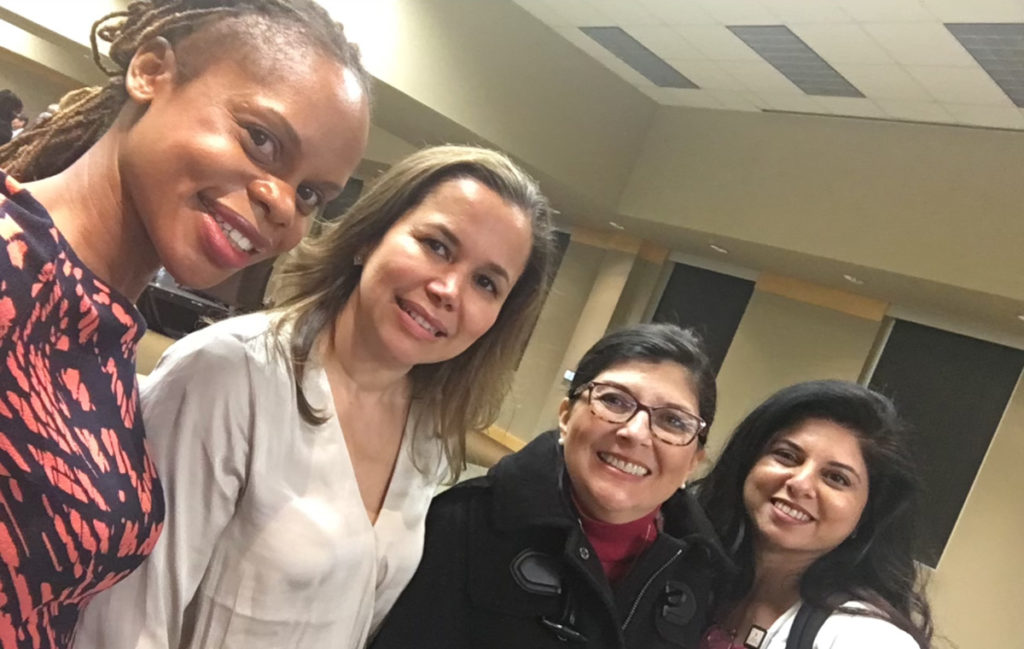Meet Parkland’s Teresita Oaks

News reports indicated U.S. authorities saw immigrant children traveling alone nearly 9,500 times in February 2021, dropping from the peak of 12,000 times in May 2019: In early Spring 2021, more than 3,000 immigrant teenagers, mostly boys, arrived in Dallas from Mexico without their parents. The Kay Bailey Hutchison Convention Center was converted to a shelter for young men, ages 15-17. Caring for these immigrants took several agencies and the community’s hands-on support, in the form of volunteers. HAS21 Keynote Panelist and Costa Rican native Teresita Oaks, Parkland Hospital’s Community Health Programs Director, was consistently there after work, offering support and compassion. A mother of two and fluent in Spanish, Oaks’ kindness, and love, coupled with the ability to connect using the same language, made a meaningful difference in so many lives.
Oaks recalled, “Many of these boys and young men had never been away from their communities or families and were now separated from them in unimaginable ways. Serving as an interpreter for the boys and helping them place a call home brought a new ray of hope to their eyes. It was such an easy thing to do, but so critical for their overall wellbeing.”
Oaks also brings a ray of hope to many in the community because of her day job. She leads the efforts associated with the system’s Community Health Needs Assessment (CHNA). Parkland Health & Hospital System (Parkland) and the Dallas County Health and Human Services (DCHHS) undertook a joint CHNA in adherence to the Patient Protection and Affordable Care Act (ACA) and as part of the accreditation process for public health departments. In accordance with the ACA, Parkland’s Board of Managers accepted the CHNA on September 18, 2019. The overarching goal was to identify the geographic areas and populations with the most significant health disparities including, racial and ethnic minorities, low social economic populations, underserved populations, those with chronic disease and those with infectious disease. The methodology framework used for this CHNA includes: Public Health Practice, Community Based Participatory Research, Strategic Planning as well as qualitative and quantitative data analysis. The data used for this report was gathered from an array of data sources and from a series of focus groups conducted throughout Dallas County. *
“We have made some key decisions about closing gaps because of the insights gained from this data and analytics,” said Oaks. “One of our greatest area of focus is on maternal and infant health and we are seeing results from our Extending Maternal Care After Pregnancy (eMCAP) program that launched in October 2020. We need to reduce the alarming maternal mortality rates in vulnerable areas of Dallas County.”
A 2018 Texas Health and Human Services report by the Maternal Mortality and Morbidity Task Force showed that 62 percent of the state’s maternal mortality cases from 2012 to 2015 occurred between six weeks and one year after delivery. The eMCAP program shifts the focus of maternal and fetal care to delivery and beyond, continuing during the first year postpartum, focusing on a geographic area of Dallas County that is underserved and a healthcare desert.
“We are expanding our reach and reconsidering access. The data shows that women living in these communities experience great difficulties with insurance coverage and access to care, food, and transportation. eMCAP has a multidisciplinary team that visits new mothers in their own homes and communities. These home visits offer a deeper understating of the struggles and joys of these new mothers, they connect a data point with a person and a community. In other words, they humanize the data,” Oaks explains.
There are so many eMCAP patient successes stories:
- A 39-year-old mother with congenital hearing loss whose hearing aid had broken and wasn’t able to hear her newborn infant’s cry. Parkland’s team replaced the hearing aid and scheduled an evaluation with Parkland’s Ear/Nose/Throat clinic.
- A 22-year-old mother facing eviction was united with Dallas Healthy Start.
- A 30-year-old mother with severe eclampsia is receiving follow-up medication and monitoring for high blood pressure control.
From the program’s launch on October 1, 2020, the eMCAP program has enrolled more than 800 women who benefit from a holistic approach that addresses physical, mental, and environmental risks.
“I am so proud of our ability to improve health equity in Dallas County, especially for women and children,” said Oaks. “The data helps us see where to focus. Humanizing the data and witnessing and responding to the risk factors in real time, saves lives. *Source: www.parklandhospital.com and Parkland press releases

